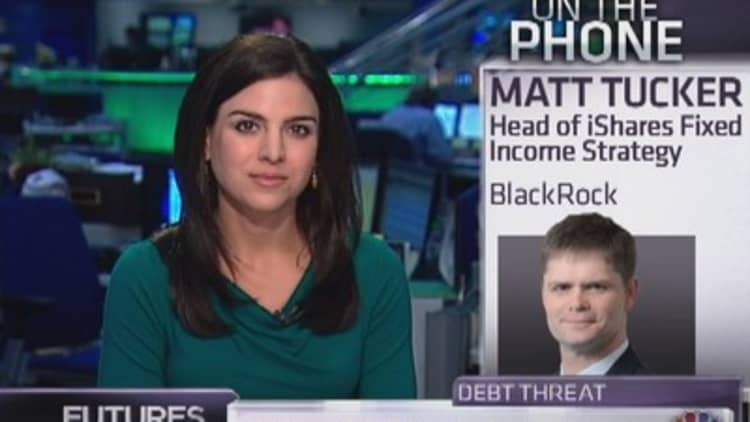Wall Street experts, who only a few days ago dismissed a debt default as a near-impossibility, are now having to come to grips with a worst-case scenario that no longer seems so far-fetched.
Consensus opinion had it that Washington politicians, for all their partisan rancor, would never be so irresponsible as to allow the U.S. to miss even a debt interest payment.
But with both sides recalcitrant and no progress made in negotiations, strategists and economists are beginning to caution clients that the probability of default is rising.
"The likelihood of an amicable settlement of the looming debt ceiling deadline appears highly questionable," Wells Fargo strategists Paul J. Mangus and Darrell Cronk said in a report.

(Read more: No way US would allow debt default? Don't bet on it)
"This is not to say that the winds of politics might not shift in the next two weeks, but the markets are becoming increasingly skeptical over the recent level of discord in Congress," they added. "This suggests that, at least in the short-term, we can expect more episodic swings of market volatility than usual."
The change in analyst tone may not necessarily be reflected in market behavior yet, but some dynamics are changing.
One-year Treasury credit default swaps—the cost of insuring U.S. debt—have seen prices surge, with Tuesday alone seeing a 10 percent rise. An auction for three-year notes Tuesday was mediocre, with the lowest demand since June.
Also, the , a popular gauge of market fear, gained more than 6 percent and eclipsed the 20 mark, considered a dividing line for significant levels of investor unease. The VIX had last breached 20 in June 2012 amid intensifying fears over the European debt crisis.
Equity market indexes such as the have been in a slow, orderly melt lower and seem to be waiting for a reason to rally.
The next metric the market may turn to for confirmation of a debt default is the $3 trillion repo market, where money-center banks go for their short-term financing needs.
(Read more: So what if there's adefault? 5 things to remember)
"The repo market has not yet shown signs of stress; however, if no agreement on the debt ceiling is reached then that could change rapidly," cautioned Fred Cannon, analyst at financial services firm Keefe, Bruyette & Woods. "We believe the repo market should be monitored closely and if a sell-off happens, investors should move to a defensive position in financial stocks."
JPMorgan Chase and Bank of New York Mellon are key players in repos, as they provide clearing services for short-term financing deals and thus "are especially important to the U.S. financial system and the real economy because they allow easy access to liquidity for banks and brokers to provide to their clients," Cannon said in a note.
A breakdown in the repo market was a key event in the financial crisis, when banks began to doubt each others' collateral and refused to lend overnight funds.
"Participants are prone to exit quickly if they believe that counter-parties are a risk," Cannon said. "We believe that this will result in the repo market showing the first signs of stress if investors lose confidence in the Treasury to pay its bills if the debt ceiling isn't raised."
Currencies also will bear watching, with the dollar gaining marginally since the government shutdown.
(Read more: World scrambles fordollars as debt deadline looms)
"There are growing signs that the U.S. debt debacle is no longer just on the periphery of investors' minds," Christopher Vecchio, currency analyst at DailyFX, said in a statement. "The safe havens—the Japanese yen and the Swiss franc—should stand to benefit above all else if the Oct. 17 deadline creeps forward without any tangible resolution in sight."
Goldman Sachs also weighed the possibility of a default, figuring that the economy could lose $75 billion to $175 billion on a pullback that would result from the U.S. being late on its debt payments.
Economist Alec Phillips said the loss "could result in a meaningfully negative effect on economic activity if not addressed quickly."
But the damage would not approach the devastation to the economy from the financial crisis and its triggering event, the collapse of Lehman Brothers, according to Julian Jessop, chief global economist at Capital Economics in London.
(More: Watch Art Cashin: Why I'm a 'little anxious' now)
"Speculation that a limited default by the U.S. government would lead to a bigger financial and economic crisis than the collapse of Lehman Brothers is surely overdone," Jessop said in an analysis. "The crucial difference is that the U.S. government would still be a going concern, with all the tax and spending powers of a sovereign state."
Still, he said that doesn't mean there would be no effects.
"While we continue to think that default will probably be avoided, it would be unwise to rule anything out," Jessop said. "A prolonged period of uncertainty would clearly be negative for the global economy and for the prices of risky assets. Nonetheless, the bottom line is that the U.S. government is not Lehman."
—By CNBC's Jeff Cox. Follow him on Twitter @JeffCoxCNBCcom.






